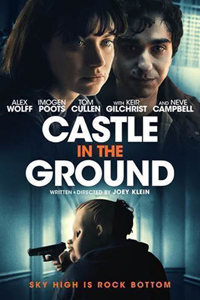Opiate of the Masses: Klein Mines Comfort in Crises with Somber Addiction Odyssey
 The trauma of substance abuse and addiction has carved out a whole subgenre of cinema, once the bastion of studio star vehicles, which resulted in revered performances in films like The Lost Weekend (1945), The Man with the Golden Arm (1955), Days of Wines and Roses (1962) and so on and so forth.
The trauma of substance abuse and addiction has carved out a whole subgenre of cinema, once the bastion of studio star vehicles, which resulted in revered performances in films like The Lost Weekend (1945), The Man with the Golden Arm (1955), Days of Wines and Roses (1962) and so on and so forth.
More recently, such dark, sordid topics have become more aligned with indie cinema as Hollywood has become obsessed with a continual output of sleek, shiny escapism. And thus, it’s become more difficult for such bleak portraits to find a foothold. Such may be the fate of the enigmatically titled sophomore film Castle in the Ground from Canadian filmmaker Joey Klein. Committed performances and a stark, subterranean pallor suggest a strong grasp of such material, but there’s a missing human component in a script which is instead defined by a specific time in specific place dealing with the onslaught of the opiate crisis. As far as slippery slopes go, it’s a film that has more to do with the slope than those mired in the descent of it.
In Sudbury, Ontario, 2012, 19-year-old Henry (Alex Wolff) is struggling with assisting his mother Rebecca (Neve Campbell), her health slowly eroded by cancer. Consumed by this situation, her sudden death causes a grief spiral, the escape of which leads him into the violent realm of his neighbor across the hall, the troubled Ana (Imogen Poots). Ana, an opiate addict, has been having difficulty getting her methadone prescription filled, and is thus on the verge of her own out-of-control spiral. Drawn into her increasingly warped dilemmas, Henry finds himself involved with Ana’s recent scheme, which involved a pill theft at her apartment when her friends Stevie (Kiowa Gordon) and Jimmy (Tom Cullen) stole the goods from her dealer Polo Boy (Keir Gilchrist). But the owners of Polo Boy’s drugs have come to collect what’s owed to them.
Castle in the Ground recalls contemporary elements from films like Requiem for a Dream (2000) in its apartment-based connectivity and even 2014’s Heaven Knows What (itself a rehash of 1971’s The Panic in Needle Park) of youthful codependency in the navigation of familial grief. Unfortunately, Castle doesn’t rise to the same heights as these, sometimes missing the necessary grit and reinforcing glue of its doomed characters.
Much of Klein’s most melancholic moments arrive in the first half, wherein Neve Campbell plays a dying mother whose son has put his life on hold to assist her. Her death, which is arguably a suicide based on purposefully mixing medications, is where the real murky moral nexus of the film should lie. However, before there’s any chance of exploring Henry’s potential wish fulfillment, he’s buried himself in distraction with Poots’ Ana, a veritable black hole of drugs and manipulation.
Once again, Poots throws herself into a frazzled, frenzied characterization (on the heels of strong genre work in Green Room or even the faulty Black Christmas rehash). However, she’s incredibly limited by Klein’s script, which never allows for the requisite humanity beyond a fleeting, superficial charm which quickly dissipates in the presence of other characters, such as an ill-suited Keir Gilchrist or a potentially too-polished Tom Cullen (whose character gets a late reveal which suggests a different tangent worthy of exploration).
A sickly, nightmarish compound of wasted revelers suggests the crack den sequence in Spike Lee’s Jungle Fever (1991), and it’s one of the few moments where Castle in the Ground hits the stride of what’s going on in 2012 Sudbury. While it doesn’t live up to the gothic resonance of its title, as an inverse phallic symbol made impotent, it suggests the subtextual poetry of (at least in title) Polanski’s Knife in the Water (1962), wherein a woman, for better or worse, is the apex of a grim microcosm.
★★½/☆☆☆☆☆


